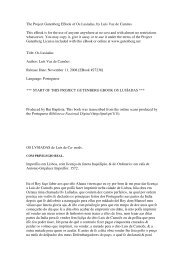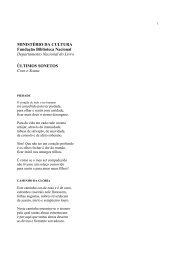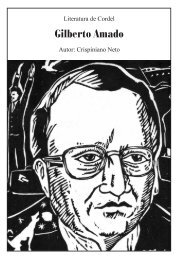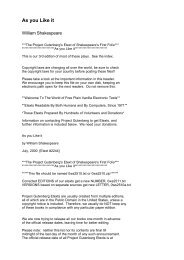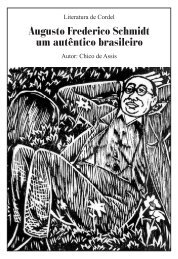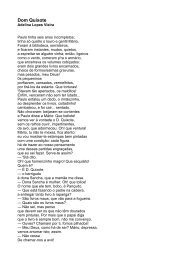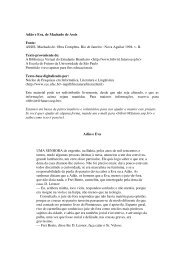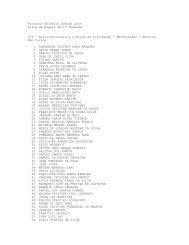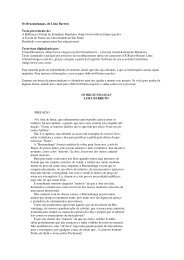You also want an ePaper? Increase the reach of your titles
YUMPU automatically turns print PDFs into web optimized ePapers that Google loves.
which make up ordinary human character. Neither his poems nor his romances show<br />
much trace of that psychological analysis which is the peculiar feature of so much<br />
modern literature. Child of the nineteenth century, as he was in so many respects, in<br />
many of the features of his art he belongs to no era, and conforms to no tendency,<br />
except that of his own Titanic genius. He could see white and he could see b<strong>la</strong>ck, but he<br />
could not see grey, and never tried to paint it. He does not allow Philip II even his<br />
redeeming virtues of indefatigable industry and unceasing devotion to duty, while in his<br />
Rome of the decadence would assuredly be found scarce five good men. His vision is<br />
curiously limited to the darker side of history; he hears humanity uttering in all ages a<br />
cry of suffering, and but rarely a shout of <strong>la</strong>ughter. He sees the oppression of the tyrant<br />
more vividly than the heroism of the oppressed. Has he to write of the power of Spain?<br />
It is in the portrayal of the tyrant of Spain rather than the men who overcame Spain that<br />
his genius finds scope. Does he wish to paint the era of religious persecution? It is the<br />
horror of the Inquisition rather than the heroism of its victims that is pictured on his<br />
canvas. Delineations of heroic virtue there are indeed in the Légende, but it is<br />
noteworthy that they occur usually in fictions such as Éviradnus, Le Petit Roi de Galice,<br />
and La Confiance du Marquis Fabrice. 1 He has given us no historical portraits of noble<br />
characters which can be put side by side with those of Philip II and Sultan Mourad. As<br />
in his dramas, his kings and rulers are always drawn in dark colours. His heroes belong<br />
to the c<strong>la</strong>sses that he loved, poor people, common soldiers, old men, children, and, be it<br />
added, animals. He is always the man of great heart and strong prejudices, never the<br />
dramatist or the philosopher.<br />
Footnote 1: (return) It is interesting to observe how frequently his heroes are old men,<br />
as Éviradnus, Booz, Fabrice.<br />
Hugo himself says sadly in his Preface, 'Les tableaux riants sont rares dans ce livre; ce<strong>la</strong><br />
tient à ce qu'ils ne sont pas fréquents dans l'histoire,' but in truth the tinge of gloom<br />
which lies upon the Légende is rather the impress upon the volume of history of the<br />
poet's own puissant individuality. He was no scientist and no savant, he had none of that<br />
spirit of imperturbable calm with which Shakespeare surveyed all mankind, none of that<br />
impartial sympathy with which Browning investigated the psychology of saints and<br />
sinners alike. He loved deeply and he hated fiercely, and his poetry was the voice of his<br />
love and his hate. The intensity of his own poetic vision made the past stand before him<br />
as clearly as the present; the note of personal feeling is as clear and strong in Sultan<br />
Mourad and Bivar as in Les Châtiments or Le Retour de l'Empereur. His great qualities<br />
of heart and mind and his singu<strong>la</strong>r defects are written <strong>la</strong>rge upon every page of the<br />
Légende. His passionate hatred of injustice and his passionate love of liberty, his<br />
reverence for the virtues of the home, and especially for filial obedience and respect, his<br />
love for little children, his antagonism to war and his admiration for what is great in war<br />
which was ever struggling with that antagonism, his patriotic feeling for the triumphs of<br />
the Napoleonic era, to him the heroic age of French history, his exaggerated belief in the<br />
wickedness of kings and the innocence of poor people, the exaltation of pity into the<br />
greatest of all virtues—these and many other characteristic traits find ample illustration<br />
in his legend of the centuries. It is ever Hugo that is speaking to us, however many be<br />
the masks that he wears.<br />
Yet it would be a mistake to suppose that no general conception of the history and<br />
<strong>des</strong>tiny of mankind is to be found in the work, or that the author had no sense of an<br />
increasing purpose running through the ages. The conception is no doubt that of a poet




